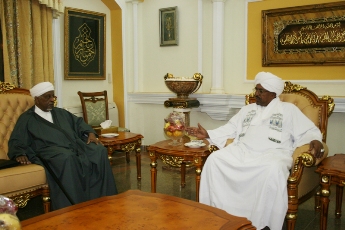Sudan’s ruling party hopes opposition DUP will join gov’t
October 23, 2011 (KHARTOUM) – Sudan’s ruling National Congress Party (NCP) on Sunday appeared optimistic that the opposition Democratic Unionist Party (NCP) is going to join the government, stoking widespread rumors to this effect.

The announcement of the new government, which was supposed to be made in late August, has been delayed as the NCP sought to persuade the DUP led by Mohamed Osman Al-Mirghani and the National Umma Party (NUP) of Al-Sadiq al-Mahdi to join the government.
Observers say that the NCP’s attempt to include the two largest opposition parties was aiming to drive them away from other opposition groups bent on regime-change agendas and thus ease rising tension in the domestic political arena.
Both of DUP and NUP this month announced that their dialogue with the NCP to join the government had reached a dead end but they left the door open for talks on other issues.
Youssef expressed hope that the DUP would accept the participation offer, adding that the “next few hours” would be “decisive” in determining the party’s final decision.
Whereas the NUP appeared genuine about its decision not to join the government and declared adoption of “civil struggle” to oppose the government, the DUP faltered as some of its officials indicated dissatisfaction with the offer they received from the NCP.
The NCP’s spokesman said that dialogue with the DUP was still continuing. “We hope it will result in their participation in the government,” Youssef said.
Youssef failed to specify a date for the announcement of the new government’s formation, saying that delays in announcing it was due to his party’s efforts to include other political parties.
The NCP official denied rumors that his party asked the DUP to distance itself from its members who are calling for regime-change, namely the DUP’s deputy chairman Ali Mahmoud Hasanain and Al-Tom Hago who recently aligned with rebels fighting the government in Blue Nile State.
According to Youeesf, the NCP did not talk about individuals during its dialogue with opposition parties. “We continue to affirm that we are negotiating with political parties about the country’s basic and urgent issues,” he added.
Meanwhile, the DUP has announced that security authorities arrested five of its members on Thursday, 18 October, as they were standing in front of a mosque belonging to the DUP-aligned religious sect of Al-Khattmiya in Khartoum North.
The DUP said that four of the arrested members were released while the fifth remains in detention.
In a related vein, the NUP’s leader and former Prime Minister Al-Sadiq al-Mahdi conveyed the result of his party’s dialogue with the NCP to opposition groups allied under the umbrella the National Consensus Forces (NCF).
Al-Mahdi informed the leadership of the NCF, which comprises the Popular Congress Party (PCP) of Hassan Al-Turabi and the Sudanese Communist Party, that the NUP’s dialogue with the NCP had come to an end due to the latter’s rejection of the national agendas proposed by his party.
As mentioned in a press release by the NUP, Al-Mahdi suggested to the NCF’s parties to agree on a set of comprehensive national agendas to address Sudan’s crises and determine the principles needed to establish an alternative system that achieves peace and democratic transformation.
He called for widening the structure of the NCF to assimilate unions of civil forces and national personalities. Al-Mahdi further said it was necessary for political parties to agree on an effective mean and political programme to achieve the desired alternative system.
(ST)
